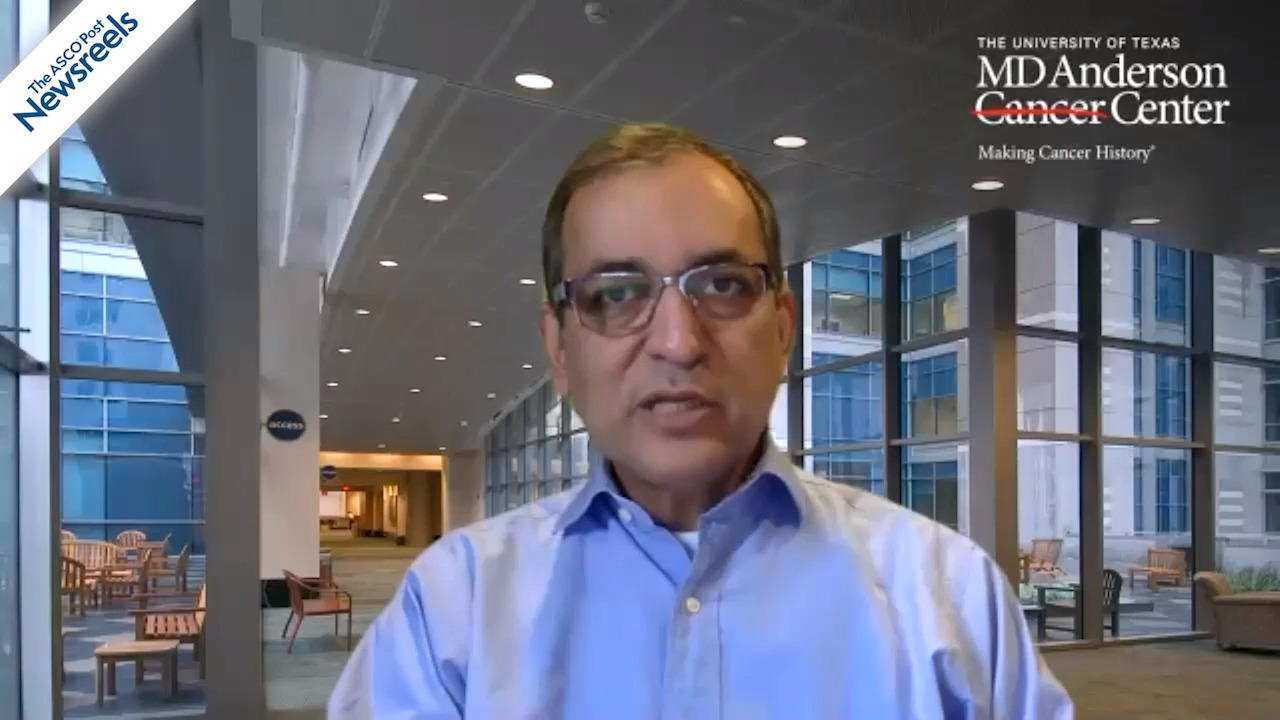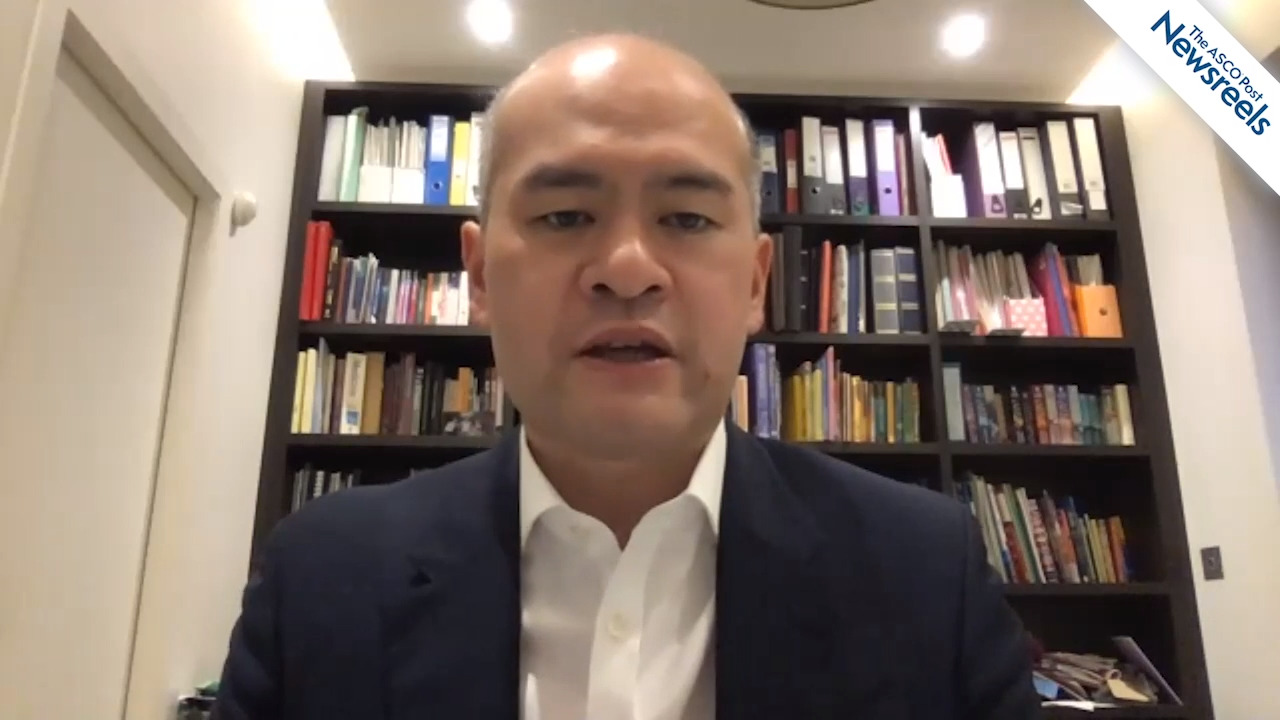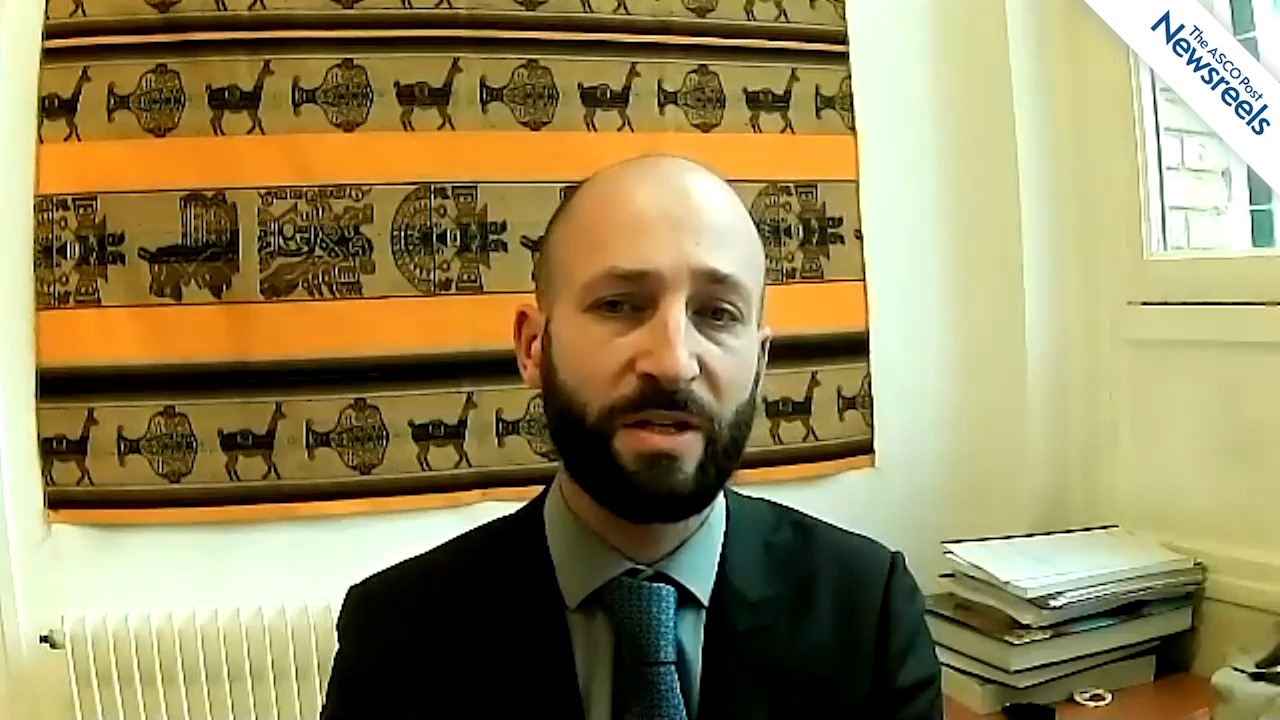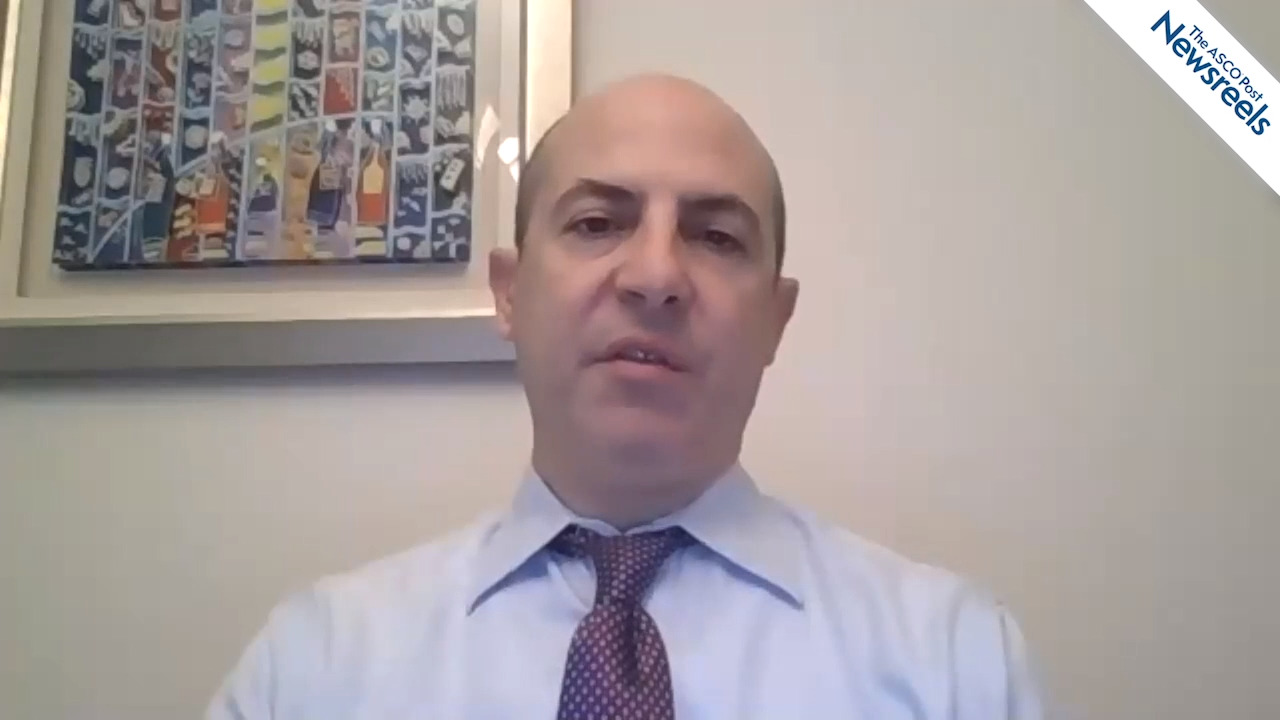2021 Gastrointestinal Cancers Symposium
KEYNOTE-177: New Analysis Confirms Benefit of Pembrolizumab vs Chemotherapy in Microsatellite Instability–High Advanced Colorectal Cancer
In an updated analysis of the pivotal phase III KEYNOTE-177 trial of pembrolizu-mab for microsatellite instability–high (MSI-H) metastatic colorectal cancer, the benefit of first-line pembrolizumab co...
In Cholangiocarcinoma, Does Chemotherapy Response Vary According to FGFR2 Status?
With inhibitors of fibroblast growth factor receptor 2 (FGFR2) fusion and other genetic alterations now in clinical trials for cholangiocarcinoma, there is interest in better understanding what FGFR2 ...
Oncologist Survey Identifies Knowledge Gaps in Cholangiocarcinoma Mutations
In the treatment of cholangiocarcinoma, many clinicians may be unaware of the importance of the major oncogenic mutations and other alterations that can be identified and targeted, according to a surv...
Study Reports Little Benefit to Adding Pembrolizumab to Neoadjuvant Therapy for Locally Advanced Rectal Cancer
The addition of pembrolizumab to neoadjuvant chemotherapy and radiotherapy (ie, total neoadjuvant therapy) failed to improve a rectal cancer–specific surrogate for survival in patients with locally ad...
KEYNOTE-177: New Analysis Confirms Benefit of Pembrolizumab vs Chemotherapy in Microsatellite Instability–High Advanced Colorectal Cancer
In an updated analysis of the pivotal phase III KEYNOTE-177 trial in microsatellite instability–high (MSI-H) metastatic colorectal cancer, the benefit of first-line pembrolizumab continued beyond dise...
FGFR2 Inhibitor Infigratinib Active in Chemotherapy-Refractory Cholangiocarcinoma
The novel targeted agent infigratinib (BGJ398) showed clinically meaningful activity against chemotherapy-refractory cholangiocarcinoma in patients with fibroblast growth factor receptor (FGFR2) fusio...
Updated Findings Bolster the Use of Checkpoint Inhibitors in Treatment of Liver Cancer
Although optimal regimens are still being determined, checkpoint inhibition has clearly established itself in the treatment of hepatocellular carcinoma, as judged by the number of abstracts on the to...
Expert Point of View: John C. Krauss, MD
The invited discussant of the GARNET study, John C. Krauss, MD, Medical Oncology Director of the Multidisciplinary Colorectal Cancer Clinic, Rogel Cancer Center of the University of Michigan, Ann Arbo...
Anti–PD-1 Antibody Dostarlimab Active in Mismatch Repair–Deficient Gastrointestinal Tumors
Dostarlimab, a monoclonal antibody targeting PD-1, showed antitumor activity in patients with mismatch repair–deficient (dMMR) gastrointestinal tumors in the phase I GARNET study, reported at the 2021...
Expert Point of View: Michael J. Overman, MD
The study’s invited discussant, Michael J. Overman, MD, Professor of Gastrointestinal Medical Oncology at The University of Texas MD Anderson Cancer Center, Houston, said the findings of the study pre...
Predicting Postoperative Recurrence in Stage I to III Colorectal Cancer With Circulating Tumor DNA
Patients with stage I to III colorectal cancer who have a high risk for recurrence may be identified by serial testing of circulating tumor DNA (ctDNA) after resection, according to a study in which c...
Expert Point of View: Rachna T. Shroff, MD
Invited discussant of the ClarIDHy trial, Rachna T. Shroff, MD, Associate Professor of Medicine, University of Arizona, and Chief of GI Medical Oncology at the University of Arizona Cancer Center, sai...
ClarIDHy Trial: IDH1 Inhibitor Ivosidenib Benefits Survival in Cholangiocarcinoma
Ivosidenib, an inhibitor of isocitrate dehydrogenase 1 (IDH1), improved overall survival by almost 3 months in previously treated patients with advanced IDH1-mutated cholangiocarcinoma, compared with ...
Rocio Garcia-Carbonero, MD, on Treating Neuroendocrine Tumors of Nonpancreatic Origin With Octreotide Acetate and Axitinib
Rocio Garcia-Carbonero, MD, of Hospital Universitario 12 De Octubre, discusses results of the phase II/III AXINET trial, which showed that axitinib plus long-acting release octreotide improved overall...
Thierry André, MD, on Mismatch Repair–Deficient Solid Cancers: Safety and Efficacy of Dostarlimab
Thierry André, MD, of Hôpital Saint-Antoine, discusses results from the GARNET study, which showed that dostarlimab, an anti–PD-1 antibody, demonstrated durable antitumor activity in patients with mis...
Andrew X. Zhu, MD, PhD, on IDH1-Mutant Cholangiocarcinoma: Ivosidenib vs Placebo
Andrew X. Zhu, MD, PhD, of Massachusetts General Hospital, discusses final results from the phase III ClarIDHy study, which showed that ivosidenib may improve overall and progression-free survival com...
Matthew H.G. Katz, MD, on Pancreatic Cancer: Preoperative mFOLFIRINOX for Resectable Disease
Matthew H.G. Katz, MD, of The University of Texas MD Anderson Cancer Center, discusses findings from the Alliance A021501 study, which showed that administering mFOLFIRINOX before surgery was associat...
Talia Golan, MD, on Pancreatic Cancer: Olaparib for BRCA-Mutated Disease
Talia Golan, MD, of the Oncology Institute, Sheba Medical Center, discusses phase III results from the POLO trial, which explored the question of whether maintenance olaparib could improve overall and...
Richard S. Finn, MD, on HCC: Atezolizumab Plus Bevacizumab vs Sorafenib
Richard S. Finn, MD, of the UCLA Medical Center, discusses updated results from the IMbrave 150 study, which showed atezolizumab plus bevacizumab provides the longest overall survival seen in a front-...
Tenna V. Henriksen, PhD Candidate, on Colorectal Cancer: Circulating Tumor DNA Analysis to Improve Treatment
Tenna V. Henriksen, PhD Candidate, of Aarhus University, discusses her findings on how circulating tumor DNA may help assess recurrence risk and the benefit of adjuvant therapy, and more quickly detec...
Milind M. Javle, MD, on Cholangiocarcinoma: Treatment With Infigratinib
Milind M. Javle, MD, of The University of Texas MD Anderson Cancer Center, discusses phase II study results showing that the novel tyrosine kinase inhibitor infigratinib may prove to be effective in t...
Anti–PD-1 Therapy Dostarlimab for dMMR Gastrointestinal Cancers: Safety and Efficacy Examined
Dostarlimab, a monoclonal antibody targeting PD-1, showed strong and durable antitumor activity in patients with mismatch repair–deficient (dMMR) gastrointestinal tumors in the phase I GARNET study, r...
Bemarituzumab Plus Chemotherapy Improves Outcomes in Advanced Gastric/Gastroesophageal Junction Cancer
Gastric cancer has a new target: fibroblast growth factor receptor 2b (FGFR2b). Targeting FGFR2b with bemarituzumab plus chemotherapy led to clinically meaningful and statistically significant improve...
Kai-Keen Shiu, MD, PhD, on Colorectal Cancer: Pembrolizumab vs Chemotherapy for Microsatellite Instability–High Disease
Kai-Keen Shiu, MD, PhD, of the University College Hospital NHS Foundation Trust - London, discusses an interim analysis of PFS 2 results (defined as time from random assignment to progression on the n...
Romain Cohen, MD, PhD, on Colon Cancer: Prognostic Value of Tumor Deposits
Romain Cohen, MD, PhD, of the Mayo Clinic and Sorbonne University, discusses a post-hoc analysis of phase III results from the CALGB/SWOG 80702 study, which showed that adding the number of tumor depo...
Rutika Mehta, MD, MPH, on Gastric Cancer: Adjuvant Chemotherapy With S-1 and Docetaxel
Rutika Mehta, MD, MPH, of the H. Lee Moffitt Cancer Center and Research Institute, discusses the 3-year regression-free and overall survival results from the JACCRO study, which compared the efficacy ...
Afsaneh Barzi, MD, PhD, on Disparities in Access to Screening and Treatment of GI Cancers
Afsaneh Barzi, MD, PhD, of the City of Hope Comprehensive Cancer Center and the University of Southern California, discusses reasons for the incomplete understanding of the molecular landscape of mino...
Wasat Mansoor, MBChB, PhD, on Esophageal Cancer: Quality of Life With Pembrolizumab and Chemotherapy
Wasat Mansoor, MBChB, PhD, of The Christie NHS Foundation Trust, discusses phase III results from the KEYNOTE-590 trial, which showed no deterioration in health-related quality of life when pembrolizu...
Postsurgical Disease Recurrence in Stage I to III Colorectal Cancer May Be Predicted by ctDNA
Patients with stage I to III colorectal cancer and a high risk for disease recurrence may be identified by serial testing of circulating tumor DNA (ctDNA) after resection, according to a study in whic...
IDH Inhibitor Ivosidenib Improves Overall Survival in Previously Treated Patients With Cholangiocarcinoma: ClarIDHy Trial
Ivosidenib, an inhibitor of isocitrate dehydrogenase 1 (IDH1), improved overall survival by almost 3 months compared with placebo in previously treated patients with advanced IDH1-mutated cholangiocar...
Zev A. Wainberg, MD, on Gastric/Gastroesophageal Junction Adenocarcinoma: Bemarituzumab and FOLFOX
Zev A. Wainberg, MD, of UCLA Medical Center, discusses phase II results from the FIGHT study, which combined bemarituzumab with modified FOLFOX6 in first-line treatment of advanced gastric/gastroesoph...














